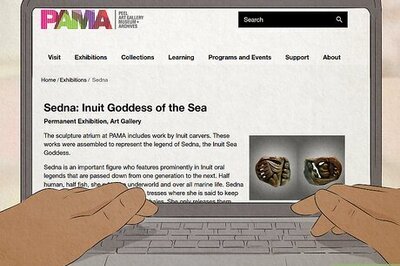
views
Hong Kong: The cholera bacterium has undergone important mutations in recent years, causing longer outbreaks of the disease with increased fatalities, researchers reported on Wednesday.
In a package of papers published in the journal PLoS Neglected Tropical Diseases, they said mass vaccinations should be considered as a solution even after outbreaks have begun.
Experts have differed over the usefulness of cholera vaccine once an outbreak has occurred, a debate reignited by a recent epidemic in Haiti.
Edward Ryan, a researcher at Massachusetts General Hospital and Harvard University in the United States, said a hybrid strain of cholera underwent two major changes in the last 20 years.
The first mutation resulted in the bacterium infecting patients thought to be immune because of previous exposure to an older strain. The second made it more dangerous.
"Cholera caused by the hybrid strain may be more clinically severe and ... may explain why we are seeing case fatality rates of 1 to 5 percent in recent outbreaks as opposed to under 1 percent historically accepted as the goal for response teams," Ryan wrote in an editorial.
Many experts oppose cholera vaccines, saying resources in an outbreak should focus on rehydrating the sick and providing safe water and improved sanitation.
The controversy re-emerged in Haiti when cholera broke out in October 2010 in the aftermath of a January earthquake that killed more than 250,000. The cholera epidemic has since made at least 105,000 people ill and killed more than 2,000.
But with the new cholera strain posing a greater threat, lasting longer and with the availability of improved vaccines, the time has come for a rethink, Ryan wrote.
Cholera is a global threat and remains a challenge to countries without safe drinking water and adequate sanitation.
CAN KILL WITHIN HOURS
Caused by a water-borne bacteria called vibrio cholera, it is transmitted when contaminated human fecal matter gets into water, food or onto someone's hands. It can cause severe diarrhea and vomiting that dehydrates victims and can kill within hours.
Many people show no symptoms but can pass the bacterium further. Most patients can be treated with oral rehydration solution and, if these are not tolerated, intravenous fluids. Antibiotics are used for severe cases.
There are only about 200,000 to 300,000 doses of cholera vaccine available in the world, and only two companies produce it. Sanofi Aventis's India-based division Shantha Biotechnics makes a vaccine called Shanchol for about $1 a dose, with up to three doses needed for protection, while Netherlands-based Crucell makes another called Dukoral.
The PLoS package also included a study from Vietnam, which showed how mass vaccination helped control the disease in Hanoi even after an outbreak occurred in 2007.
Fifteen percent of patients given the oral vaccine came down with cholera subsequently, compared to 30 percent of those not vaccinated, wrote the team led by Dang Duc Anh at the National Institute of Hygiene and Epidemiology in Hanoi.
Another team led by Rita Reyburn at the International Vaccine Institute in Seoul published another paper using data from a 2008-2009 cholera epidemic in Zimbabwe, which infected 100,000 people and killed 4,287.
Using mathematical models, the study showed that if vaccination had taken place after the first 400 cases, as many as 34,900 cases and 1,695 deaths might have been prevented.
There are an estimated 3 to 5 million cholera cases and 100,000 to 120 000 deaths due to cholera every year, according to the World Health Organisation.

















Comments
0 comment